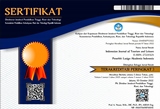The Community Participation in the Development of Gunung Salak Tourism Village, Tabanan, Bali, Indonesia
Abstract
Gunung Salak Village Tabanan has the potential to attract natural tourism, customs, arts, and culture based on Hinduism, and is a strong potential to support its development into a Tourism Village. The development of Gunung Salak Tourism Village aims to improve the economy and advance the quality of life of the community. Data were collected through observation and interviews with purposive sampling method involving village leaders and Gunung Salak Village officials, namely Perbekel, Bendesa Adat, Kelian Dinas, Kelian Adat, BPD, Pokdarwis, and Head of BUMDes The collected data were tabulated and validated through Focus Group Discussion for further analyzed by qualitative descriptive. The results showed that the level of community participation was very good at the partnership level (level 6) where the position of the village government and the community became equal in authority and responsibility. It can be seen that participation is following Arnstein's characteristics, namely: initiation of submission of ideas and proposals from the community which is carried out in stages through Banjar institutions through customary and service groups. planning is still being assisted by another party, namely the Bali State Polytechnic, the power-sharing structure is carried out through Pokdarwis with Bumdes. While the forms of participation include the dimensions of thought, the dimensions of energy, and the dimensions of matter. Suggestions that can be submitted are that the village still needs assistance from the university for human resources training and determining the concept of developing the Gunung Salak Tourism Village based on local potential.
Keywords
Full Text:
PDFReferences
Abe, A. (2002). Perencanaan daerah partisipatif, pondok edukasi. Solo.
Adiyoso, W. (2009). Menggugat perencanaan partisipatif dalam pemberdayaan masyarakat. PMN.
Arnstein. (1999). Participatory planningA view of tourism in Indonesia. Annals of Tourism Research, 26(2), 371–391.
Astiti, S., Wayan, N., Windia, W., & Lestari, P. F. K. (2015). Penerapan Tri Hita Karana untuk Keberlanjutan Sistem Subak yang Menjadi Warisan Budaya Dunia: Kasus Subak Wangaya Betan, Kecamatan Penebel, Kabupaten Tabanan. Jurnal Manajemen Agribisnis, 3(1), 26290.
Cornwall, A. (2008). Unpacking ‘Participation’: models, meanings and practices. Community Development Journal, 43(3), 269–283.
Dewi, M. H. U., Fandeli, C., & Baiquni, M. (2013). Pengembangan Desa Wisata Berbasis Partisipasi Masyarakat Lokal di Desa Wisata Jatiluwih Tabanan, Bali. Kawistara, 3(2), 117–226.
Ghosh, R. N., Siddique, M. A. B., & Gabbay, R. (2003). Tourism, ecotourism and economic development: An overview. Tourism and Economic Development: Case Studies from the Indian Ocean Region, 1–7.
Karnayanti, N. M. D., & Mahagangga, I. (2019). Partisipasi Masyarakat Dalam Pengelolaan Desa Wisata Bongkasa Pertiwi Di Kabupaten Badung. Jurnal Destinasi Pariwisata, 7(1), 54–60.
Laksana, N. S. (2013). Bentuk-bentuk partisipasi masyarakat desa dalam program desa siaga di Desa Bandung, Kecamatan Playen, Kabupaten Gunung Kidul, Provinsi Daerah Istimewa Yogyakarta. Jurnal Kebijakan Dan Manajemen Publik, 1(1).
Lu, J., & Nepal, S. K. (2009). Sustainable tourism research: An analysis of papers published in the Journal of Sustainable Tourism. Journal of Sustainable Tourism, 17(1), 5–16.
Martini, A., & Wandi, M. A. (2019). Empowerment of Beef Cattle Livestock by Bone District South Sulawesi Province. Jurnal Ilmiah Administrasi Pemerintahan Daerah, 11(2), 97–108.
Neno Rizkianto, T. (2018). Pengembangan Pariwisata Berbasis Masyarakat Di Desa Wisata Banjarejo Kabupaten Grobogan. Jurnal Administrasi Bisnis (JAB), 58(2), 20–26.
Ngongare, A., Rompas, W. Y., & Kiyai, B. (2019). Partisipasi Masyarakat Dalam Pembangunan Desa Di Desa Hatetabako Kecamatan Wasile Tengah Kabupaten Halmahera Timur. Jurnal Administrasi Publik, 5(73).
Nurhidayati, T. (2012). Empati dan munculnya perilaku altruistik pada masa remaja (studi analisis dunia remaja). Edu Islamika, 4(1), 101–123.
Paramitasari, I. D. (2010). Dampak Pengembangan Pariwisata Terhadap Kehidupan Masyarakat Lokal (Studi Kasus: Kawasan Wisata Dieng Kabupaten Wonosobo).
Rahman, C. N. A., & Idajati, H. (2017). Karakteristik kawasan wisata di Desa Ngunut Kabupaten Bojonegoro dengan konsep community based tourism. Jurnal Teknik ITS, 6(1), C71–C74.
Randolph, J. (2004). Environmental land use planning and management. Island Press.
Roth, D., & Sedana, G. (2015). Reframing Tri Hita Karana: From ‘Balinese Culture’to Politics. The Asia Pacific Journal of Anthropology, 16(2), 157–175.
Sanoff, H. (1999). Community participation methods in design and planning. John Wiley & Sons.
Sharpley, R., & Telfer, D. J. (2015). Tourism and development: concepts and issues (Vol. 63). Channel view publications.
Utama dan Mahadewi. (2012). Metodelogi Penelitian Pariwisata dan Perhotelan, Edisi 1. Yogyakarta: ANDI. AndiPublisher, 82.
Utama, I. G. B. R., Laba, I. N., Junaedi, I. W. R., Krismawintar, N. P. D., Turker, S. B., & Juliana. (2021). Exploring Key Indicators of Community Involvement in Ecotourism Management. Journal of Environmental Management and Tourism, 12(3), 808–817. https://doi.org/10.14505//jemt.12.3(51).20
Utama, I. G. B. R., Trimurti, C. P., Erfiani, N. M. D., Krismawintari, N. P. D., & Waruwu, D. (2021). The Tourism Destination Determinant Quality Factor from Stakeholders Perspective. Ndonesian Journal of Tourism and Leisure, 02(2), 96–106. https://doi.org/10.36256/ijtl.v2i2.164
Utama, I. G. B. R., Turker, S. B., Widyastuti, N. K., Suyasa, N. L. C., & Waruwu, D. (2020). Model of Quality Balance Development of Bali Tourism Destination. SSRN Electronic Journal. https://doi.org/10.2139/ssrn.3671267
DOI: https://doi.org/10.36256/ijtl.v3i1.224
Refbacks
Copyright (c) 2022 Indonesian Journal of Tourism and Leisure

This work is licensed under a Creative Commons Attribution-NonCommercial-ShareAlike 4.0 International License.
Indonesian Journal of Tourism and Leisure Indexed and Archieved By:

Indonesian Journal of Tourism and Leisure is licensed under a Creative Commons Attribution-NonCommercial-ShareAlike 4.0 International License.













